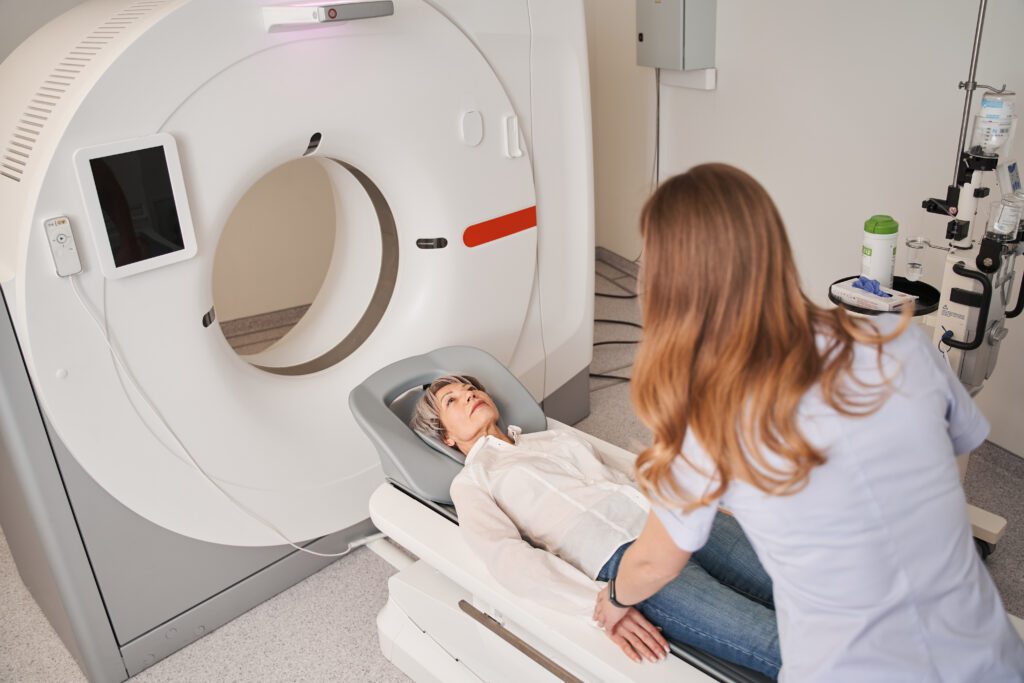A head CT scan can tell your healthcare provider a lot about the condition of your head and brain.
Whether you’ve already had a head CT scan, or you have an upcoming CT appointment, we want to help you understand the results of your head CT.
We’ll look at what a head CT is used for, at what conditions it can diagnose, and at how your healthcare team interprets your CT results.
Let’s take a deeper look at what head CTs can show.
What is a head CT scan? How does it work?
A head CT scan, also known as a computed tomography scan, is a sophisticated imaging technique that provides detailed pictures of your head’s internal structures.
It creates a series of images of the inside of your head, which look kind of like slices, and which show the structures and organs inside your head in great detail.
CT scans work by taking numerous detailed images from different angles around your head while you are inside the CT machine. It’s a lot like getting an X-ray.
In a CT scan, X-ray beams are expertly directed to encircle the patient’s body, ensuring a full 360-degree coverage.
As the CT machine rotates, these beams emit X-rays from numerous angles, capturing a unique cross-sectional snapshot of your head.
A computer then puts together these images to create a comprehensive view of the brain, skull, and other important features.
What are some reasons my healthcare provider would recommend a head CT?
Your provider ordered a head CT scan because they want to take a closer look at something in your skull or your brain.
If you’ve been experiencing symptoms such as persistent headaches, dizziness, or issues with your vision, a head CT scan can help pinpoint the cause, whether it’s inflammation, an injury, or something else.
Getting a head CT is a crucial step in evaluating symptoms that might suggest stroke, bleeding, or tumors, allowing for swift and accurate diagnosis.
What should I expect during a head CT scan?
The scan itself is quick, non-invasive, and painless. Plan for your head CT to take between 10-30 minutes, depending on the images your doctor has ordered.
You’ll be asked to lie down on a table that slides into the CT scanner, which looks like a large, doughnut-shaped machine. It’s important to remain still during the scan to ensure the clearest images possible.
You might hear some whirring or buzzing noises as the scanner creates the images, but this part of the process typically takes only a few minutes.
We want to make sure you feel as comfortable as possible during your head CT. If you need to speak with your technologist during the scan, for any reason, there is an intercom available for you.
Afterward, most people can immediately return to their normal activities, depending on the provider’s instructions.
What a head CT scan can help diagnose
Getting a head CT scan gives your doctor a series of highly detailed pictures from the inside of your head, and your healthcare team will use your results to help diagnose your condition.
Here, we’ll explore what a head CT scan can reveal, and how it contributes to diagnosing and understanding your health.
How could a head CT scan help explain my symptoms?
By creating detailed images of your head, a CT scan lets your healthcare team see beyond the surface.
This can be especially useful if you’ve been experiencing symptoms such as unexplained headaches, dizziness, or changes in your senses like vision or hearing.
A head CT scan can reveal abnormalities (like swelling, bleeding, or blockages) that might be contributing to these issues.
This can help your provider to pinpoint the cause of your discomfort, and tailor your treatment accordingly, based on your results.

What conditions are commonly diagnosed with the help of a head CT scan?
Head CT scans are adept at identifying issues within the brain, such as tumors, bleeding (also called a hemorrhage), evidence of stroke, or blood clots.
Beyond these, head CT scans can detect infections (including abscesses and encephalitis), as well as other conditions (like hydrocephalus or skull fractures).
Head CTs also play a critical role in assessing the health of brain tissues, and the presence of diseases that affect brain function, giving your provider a non-invasive way to help diagnose you.
Can a head CT scan show the cause of my headaches, stroke, or other symptoms?
A head CT scan can be particularly revealing when investigating the cause of headaches, symptoms of a stroke, or other neurological symptoms.
For headaches, the scan can identify if there’s an underlying cause such as a brain tumor, bleeding, or swelling that might be triggering the pain.
In cases of stroke, a head CT scan can quickly show areas of the brain that have been affected, which is crucial for determining the most appropriate treatment.
For other symptoms (like sudden numbness, confusion, loss of speech or vision, and severe dizziness), a head CT scan provides a clear picture of any conditions or injuries that could be the cause.
Understanding your head CT results
Your results are the entire reason for your CT scan, because they tell your provider a lot about your health, especially if you have multiple CT scans over time.
We’ll break down how your CT results are interpreted, what it means if something unusual is found, and how this information can guide your treatment options.
How will the results of my head CT scan be interpreted?
A radiologist will be the first person to look at your results. They will examine the CT images for any signs of abnormality or disease within your brain, skull, or blood vessels.
Each image from your scan offers a detailed view, allowing the radiologist to assess the health of your brain’s tissues, the structure of your skull, and the condition of your blood vessels. After this evaluation, your radiologist prepares a report summarizing the findings.
This report is then shared with your healthcare provider, who will discuss the results with you.
What happens if my provider finds something unusual on my head CT results?
Discovering something unusual on your head CT scan might initially sound alarming, but it’s important to remember that this is a step toward understanding and addressing your health concerns.
If your healthcare provider identifies an abnormality, the next steps will depend on the nature of the finding.
This could involve additional diagnostic tests for a more detailed examination, consultations with specialists for expert opinions, or immediate treatment if the condition requires urgent attention.
How could my head CT scan results help inform my treatment options?
Your head CT can help pinpoint the cause of symptoms you’re experiencing, such as headaches or dizziness.
This precision allows your healthcare provider to tailor your treatment specifically to address the underlying issue, whether it’s medication, therapy, or, in some cases, surgery.
A head CT scan can also provide your healthcare team with a baseline to monitor the progression of your condition over time, offering insights into the effectiveness of the treatment, and guiding any adjustments as necessary.
How to schedule a CT appointment with us
Reach out to us at American Health Imaging, and we’ll help you schedule an appointment at an imaging center near you, today.
We’re here to help you get the answers you need.
Frequently asked questions
What is a head CT scan?
A head CT scan is a diagnostic imaging scan that uses X-rays to create detailed images of the skull, brain, and other structures inside the head.
Why might my doctor recommend a head CT scan?
Doctors recommend head CT scans to investigate symptoms such as severe headaches, dizziness, trauma to the head, and other neurological symptoms.
What should I expect during a head CT scan?
During a head CT scan, you’ll lie on a table that slides into a large, doughnut-shaped machine, which takes images of your head as it rotates around you.
How can a head CT scan help explain my symptoms?
A head CT scan can help identify abnormalities or diseases in the brain and other head structures that might be causing your symptoms.
What are some common conditions diagnosed with a head CT scan?
Common conditions diagnosed with a head CT scan include strokes, brain tumors, hemorrhages, and traumatic brain injuries.
Can a head CT scan determine the cause of headaches or strokes?
Yes, a head CT scan can detect the underlying causes of headaches and strokes by revealing structural changes and damages in the brain.
How are the results of a head CT scan interpreted?
A radiologist will interpret your head CT scan by examining the images for any signs of injury, disease, or abnormality, and provide a detailed report to your healthcare provider.
What happens if something unusual is found in my head CT scan results?
If something unusual is found, your healthcare provider will discuss the findings with you and may recommend further testing or treatment options based on the results.
